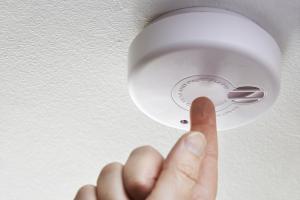Avoiding accidental fires in the home
Date published:

Causes of accidental fires
Things that increase the risk of accidental house fires include:
- cooking or cooking appliances
- cookers
- ovens
- hotplates
- grill pans
- deep fat fryers
- microwaves
- toasters
- electricity supply or other electrical equipment and appliances
- plugs
- lighting
- cables
- washing machines
- dishwashers
- tumble dryers
- smoking or smoking-related materials
- cigarettes
- matches
- lighters
Cooking
Fires from cooking and cooking appliances can be avoided by:
- never leaving cooking unattended - if you have to leave, turn the cooker off and take saucepans off the heat
- turning off hobs and ovens when finished cooking
- keeping flammable items such as tea towels and oven gloves away from the cooker
- keeping oven and grill pans free from a build-up of oils and grease, which can easily catch fire
- never throwing water onto an oil-based fire
Electrical equipment
Fires from electrical equipment can be avoided by:
- never overloading sockets
- never leaving electrical appliances such as dishwashers or washing machines running overnight or when you leave the house
Smoking
Fires from smoking materials can be avoided by:
- never smoking in bed or when feeling drowsy or tired
- always stubbing cigarettes out fully in an ashtray
Home Fire Safety Check
You can do a free Home Fire Safety Check online.
It is easy-to-follow and you answer questions about each room in your home.
Once done, you'll get a personalised fire action plan. This:
- shows the potential causes of fire in your home
and
- gives safety advice to help reduce the risk of fire
You can also do the safety check with someone you’re concerned about, especially those who may not have access to the internet.
If, at the end of the assessment, your (or their) household has been identified at a greater risk, you (or they) will be referred for an in-person Home Fire Safety Check. The Northern Ireland Fire and Rescue Service will visit to give further practical advice on fire safety.
If you have any concerns about someone not having a clear fire escape route, a working smoke alarm, or other dangers in their home, contact the Northern Ireland Fire and Rescue Service.
'STOP' fire
‘STOP Fire’ is an easy to remember fire safety tool for everyone to use.
It’s an instant checklist focusing on fire safety basics:
- smoke alarms - make sure you have at least one working smoke alarm on every floor (think about extra alarms in the most used rooms such as living rooms and bedrooms)
- test weekly - test your smoke alarm weekly or ask someone to check it for you
- obvious fire safety dangers - look out for obvious fire safety dangers, stub out cigarettes, and never leave cooking unattended
- planned escape - have a fire escape plan, keep access routes clear, close all doors at night and have your keys at the ready
You can find out more about fire safety at this link:
If you’re planning to use an open fire you haven’t used in a while, make sure a suitably-trained person services your chimney beforehand.
Make sure any portable heaters and electric blankets you use are in good working order.
Make sure as well smoke alarms, you also have a working carbon monoxide alarm.
Be responsible and protect yourself, your family and your home from fire.